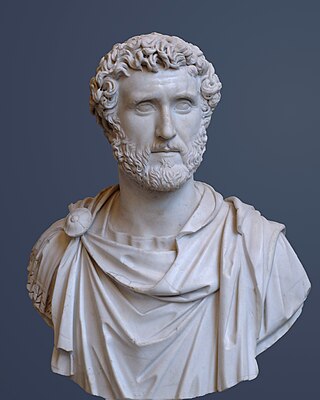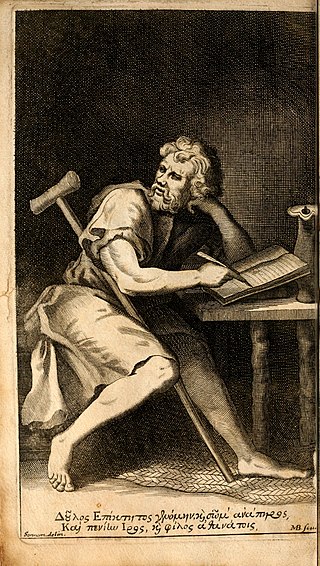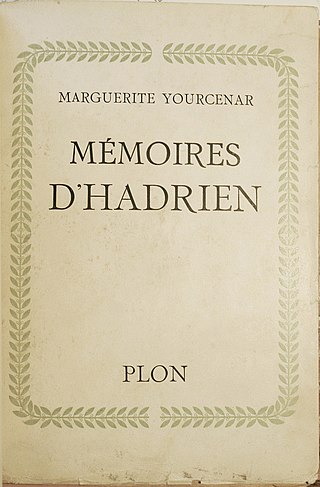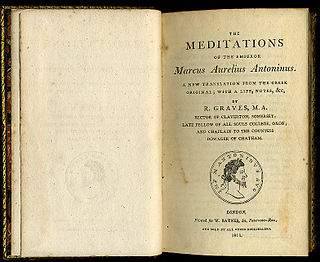
Titus Aelius Hadrianus Antoninus Pius was Roman emperor from AD 138 to 161. He was the fourth of the Five Good Emperors from the Nerva–Antonine dynasty.

Epictetus was a Greek Stoic philosopher. He was born into slavery at Hierapolis, Phrygia and lived in Rome until his banishment, when he went to Nicopolis in northwestern Greece, where he spent the rest of his life. His teachings were written down and published by his pupil Arrian in his Discourses and Enchiridion.

Hadrian was Roman emperor from 117 to 138. Hadrian was born in Italica, close to modern Seville in Spain, an Italic settlement in Hispania Baetica; his branch of the Aelia gens, the Aeli Hadriani, came from the town of Hadria in eastern Italy. He was a member of the Nerva-Antonine dynasty.

Marcus Aurelius Antoninus was Roman emperor from 161 to 180 and a Stoic philosopher. He was a member of the Nerva–Antonine dynasty, the last of the rulers later known as the Five Good Emperors and the last emperor of the Pax Romana, an age of relative peace, calm, and stability for the Roman Empire lasting from 27 BC to 180 AD. He served as Roman consul in 140, 145, and 161.

The 120s was a decade that ran from January 1, AD 120, to December 31, AD 129.

Commodus was a Roman emperor who ruled from 177 until his assassination in 192. For the first three years of his reign he was co-emperor with his father Marcus Aurelius. Commodus' sole rule, starting with the death of Marcus in 180, is commonly thought to mark the end of a golden age of peace and prosperity in the history of the Roman Empire.

Lucius Aurelius Verus was Roman emperor from 161 until his death in 169, alongside his adoptive brother Marcus Aurelius. He was a member of the Nerva–Antonine dynasty. Verus' succession together with Marcus Aurelius marked the first time that the Roman Empire was ruled by more than one emperor simultaneously, an increasingly common occurrence in the later history of the Empire.

The Historia Augusta is a late Roman collection of biographies, written in Latin, of the Roman emperors, their junior colleagues, designated heirs and usurpers from 117 to 284. Supposedly modeled on the similar work of Suetonius, The Twelve Caesars, it presents itself as a compilation of works by six different authors, collectively known as the Scriptores Historiae Augustae, written during the reigns of Diocletian and Constantine I and addressed to those emperors or other important personages in Ancient Rome. The collection, as extant, comprises thirty biographies, most of which contain the life of a single emperor, but some include a group of two or more, grouped together merely because these emperors were either similar or contemporaneous.

Memoirs of Hadrian is a French-language novel by the Belgian-born writer Marguerite Yourcenar about the life and death of the Roman Emperor Hadrian. First published in France in 1951, the book was a critical and commercial success. It was translated into English by Grace Frick and published as Hadrian's Memoirs in 1954 by Farrar, Straus and Young and the following year in the UK as Memoirs of Hadrian. American editions of this translation are now published under the latter title.

Meditations is a series of personal writings by Marcus Aurelius, Roman Emperor from AD 161 to 180, recording his private notes to himself and ideas on Stoic philosophy.

Pompeia Plotina was Roman empress from 98 to 117 as the wife of Trajan. She was renowned for her interest in philosophy, and her virtue, dignity and simplicity. She was particularly devoted to the Epicurean philosophical school in Athens, Greece. She is often viewed as having provided Romans with fairer taxation, improved education, assisted the poor, and created tolerance in Roman society.
A tribrach is a metrical foot used in formal poetry and Greek and Latin verse. In quantitative meter, it consists of three short syllables occupying a foot, replacing either an iamb or a trochee. In accentual-syllabic verse, the tribrach consists of a run of three short syllables substituted for a trochee.

Lucius Octavius Cornelius Publius Salvius Iulianus Aemilianus, generally referred to as Salvius Julianus, or Julian the Jurist, or simply Julianus, was a well known and respected jurist, public official, and politician who served in the Roman imperial state. Of north African origin, he was active during the long reigns of the emperors Hadrian, Antoninus Pius, and Marcus Aurelius, as well as the shorter reign of Marcus Aurelius' first co-Emperor, Lucius Verus.

The early life of Marcus Aurelius spans the time from his birth on 26 April 121 until his accession as Roman emperor on 8 March 161.
The Roman–Parthian War of 161–166 was fought between the Roman and Parthian Empires over Armenia and Upper Mesopotamia. It concluded in 166 after the Romans made successful campaigns into Lower Mesopotamia and Media and sacked Ctesiphon, the Parthian capital.

The reign of Marcus Aurelius began with his accession on 7 March 161 following the death of his adoptive father, Antoninus Pius, and ended with his own death on 17 March 180. Marcus first ruled jointly with his adoptive brother, Lucius Verus. They shared the throne until Lucius' death in 169. Marcus was succeeded by his son Commodus, who had been made co-emperor in 177.

In ancient Greek and Latin literature, the trochaic septenarius is a form of ancient poetic metre first used in 7th century BC Greek literature. It was one of the two most common metres of Roman comedy of the early 1st century BC and was also used for the marching songs sung by soldiers at Caesar's victory parade. After a period when it was little used, it is found again in the Pervigilium Veneris, and taken up again as a metre for Christian hymns. The same metre, with stress-rhythm replacing quantitative metre, has continued to be used, especially for hymns and anthems, right up to the present day.
Decimus Terentius Gentianus was a Roman senator of the 2nd century AD who held a number of offices in the imperial service, serving as suffect consul in 116 with Lucius Co[...] as his colleague. His origins may be in Gallia Narbonensis, and Gentianus may have been the son of Decimus Terentius Scaurianus, one of Trajan's generals.
Marcus Gavius Maximus was an eques of ancient Rome who held several imperial positions, both civil and military, under Hadrian and Antoninus Pius.















